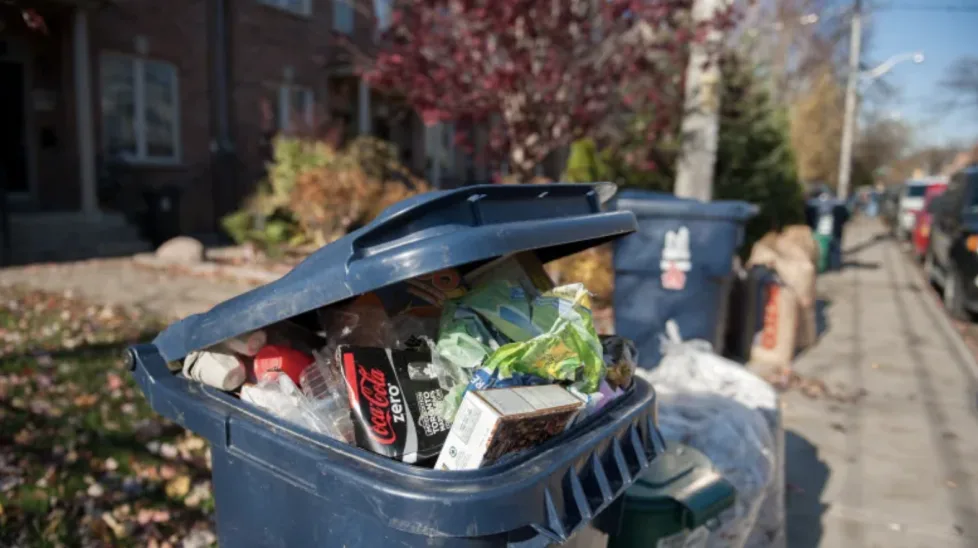
Ontario's new plastics recycling plan is 'dangerous' and 'magical thinking'
Environmentalists say there's no quick fix to the problem of plastic waste and they're worried that's exactly what the Ontario government is promising with its new recycling plan.
Doug Ford's government is embracing "advanced recycling," which uses chemicals and heat to break down non-recyclable plastic waste and convert it into fuel and other products. The province is crafting regulations for advanced recycling facilities that would exempt some projects from environmental assessments.
Proponents say advanced recycling will keep plastic products out of landfills and that the government's plan will reduce unnecessary red tape in the approval process.
But critics say the process is experimental, potentially harmful, and requires more public oversight, not less.
"The real solution is to reduce the amount of plastic that we're making," said Karen Wirsig, project manager for Environmental Defence, who describes the province's proposal as "magical thinking" and "dangerous."
"We can't simply pin all our hopes on some magical waste management technology that is totally unproven, expensive and polluting," she told CBC News on Thursday.

A recycling bin in Toronto. The Ontario government plan to adjust regulations for advanced recycling facilities worries environmentalists. (David Donnelly/CBC)
SEE ALSO: Why black plastic is hardest to recycle
The Toronto Environmental Alliance is also opposed to the government's plans.
"It's burning garbage," Emily Alfred, a waste campaigner with the organization, said in an interview.
Advanced recycling targets the roughly 50 per cent of plastics that can't be recycled traditionally, according to Elena Mantagaris, vice president of the Chemistry Industry Association of Canada (CIAC).
She cites an increasingly common type of plastic food packaging that often has a zip seal and can stand upright. Mantagaris says this packaging uses different kinds of plastic in a single product. It can't be melted down but can be broken down using advanced recycling, she says.
The heat used in the process can come from microwaves, among other sources.
"It's not incineration," Mantagaris said.
"Advanced recycling is a fundamental shift. It essentially takes the plastic back to its molecular origins, back to its raw materials."
According to Ontario's Ministry of the Environment, advanced recycling plants do not burn plastic.
"The process is usually done in a low-, or no-, oxygen state that doesn't support burning," Gary Wheeler, spokesperson for the ministry, wrote in an email response to CBC Toronto's questions.
He adds that advanced recycling projects, even those exempted from environmental assessments, will still have significant government oversight and be subject to rules under the province's Environmental Protection Act.
Along with supporting the growth of advanced recycling, the government is also committed to reducing plastic waste through its Strategy on Zero Plastic Waste, approved in 2018.
WATCH BELOW: WORLD'S HARSHEST PLASTIC USE LAWS UNCOVERED
'PRETEND RECYCLING'
But the changes proposed by the government don't ensure that enough plastic will get recycled, says Dianne Saxe, the deputy leader of the Ontario Greens. She's worried that much of the waste will just be incinerated.
"It's pretend recycling as an excuse for deluging us with more plastic while keeping the public in the dark," Saxe said.
In her previous role as Ontario's environment commissioner, Saxe wrote a report that called for "clear and robust" provincial recycling standards that establish environmental benefits. She says she doesn't see that in the plan for advanced recycling facilities.
"Plastic companies have kept saying to people, 'Don't worry, we're going to recycle it.' They've been telling us this for decades. But in fact, almost all plastic ends up either in landfills or as litter, where it chokes wildlife," she said.
INCENTIVES FOR COMPANIES
In its proposed regulations, the province wants to remove the requirement for certain advanced recycling projects to undergo an environmental assessment.
The thresholds are based on tonnes of waste treated per day and the percentage of recycled product recovered. The province wants to encourage high recovery rates by lowering the procedural burden on facilities that can recover more than 80 per cent of the waste they treat.
Very large projects, treating more than 1,000 tonnes daily, would continue to require a comprehensive environmental assessment regardless of their recovery rates.
"Despite any proposed change in [environmental assessment] requirements, all advanced recycling facilities will continue to be subject to all other permits and approvals required, including Environmental Compliance Approvals," said the government's public notice on the proposed regulations.
This article, written by Trevor Dunn, was originally published for CBC News on March 4, 2022.











